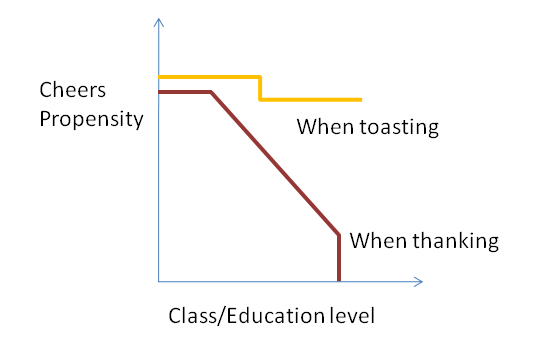'Cheers' has two main uses:
- For expressing appreciation.
- For toasting.
I have generated a small graph that plots my understanding of its usage here in the UK. I lumped class and education level together as, in this case, they probably roughly correlate. This will upset posh people as they know that class has nothing to do with where you went to uni, and will upset some educated people as posh people are all inbred thickies who only went to school for the rugger and the fagging.

Things to note about the graph:
- The propensity to use cheers as 'thanks' is level at the start and drops off a cliff at the end. This is because blue collar/working class use it for everything and properly posh landed gentry types wouldn't dream of saying it. Not in public anyway.
- When toasting it's fairly universal. There's a dip at the middle class, purely because they might use words from other languages such as salute or na zdrovyeh. The upper classes wouldn't use bloody forrin words but the dip is maintained as they might toast The Queen!
I could tweak this graph for hours - for example should the thanking line actually drop to zero as chavs/the underclass never say anything remotely resembling cheers or thank you? Does the thanking line actually have a more subtle convex gradient?
But I won't.
Two final things to note, are that it can also depend on familiarity between to the two parties conversing and the perceived formality of the occasion. If you know someone well, everyone is more more likely to use it. If you don't know someone at all, in informal conversation you can use 'cheers, thank you' as a handy catch all.
For a really good book on things like this, I recommend Kate Fox's Watching the English.


Thank youhere in Australia. It's all Cheers.